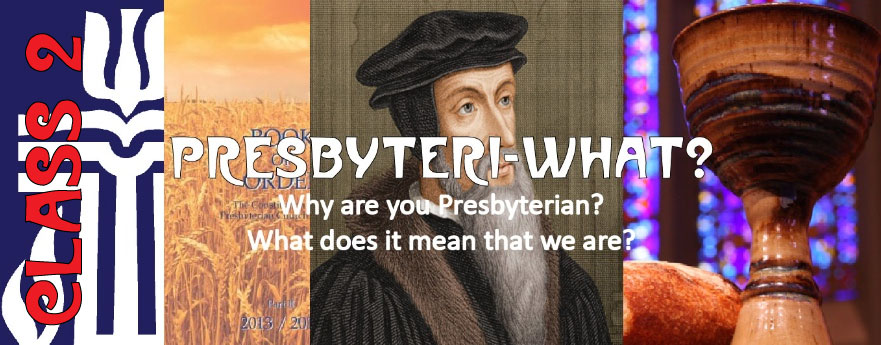THEOLOGY – means the study of (-ology in Greek) God (theos in Greek). It’s how we think and talk about God – based upon scripture, life experience, Christian tradition and specific church cultures.
Do you have any vocabulary about your personal theology? How you understand God, approach the Bible and expect the Church to be?
In the Presbyterian Church USA we are issued from Reformed theology. It’s generally considered synonymous with Calvinism and most often, in the U.S. and the UK, is specifically associated with the theology of the historic church confessions such as the Westminster Confession.
SO WHAT DOES IT MEAN TO BE REFORMED?
A summary of Reformed theology, or what it means to be Reformed, may be seen in the following 8 points (adapted from www.theopedia.com/reformed-theology)
1. It means to affirm the great “Solas” of the Reformation.
The Five Solas are five Latin phrases (or slogans) that emerged from the Protestant Reformation intended to summarize the Reformers’ basic theological principles in contrast to certain teachings of the Roman Catholic Church of the day. “Sola” is Latin meaning “alone” or “only” and the corresponding phrases are:
a. Sola Fide, by faith alone.
b. Sola Scriptura, by Scripture alone.
c. Solus Christus, through Christ alone.
d. Sola Gratia, by grace alone.
e. Soli Deo Gloria, glory to God alone.
2. It means to affirm and promote a profoundly high view of the sovereignty of God.
3. It means to affirm the doctrine of grace. . . to see God as the author of salvation from beginning to end. (See Calvinism)
4. It means to be creedal. . . to affirm the great creeds of the historic, orthodox church. (See e.g. the Nicene Creed)
5. It means to be confessional. . . to affirm one or more of the great confessions of the historic orthodox church. (see e.g. the Westminster Confession)
6. It means to be covenantal. . . to affirm the great covenants of Scripture and see those covenants as the means by which God interacts with and accomplishes His purposes in His creation, with mankind.
7. It means to take seriously the Great Commission of Matthew 28:19-20. . . to affirm the primacy of mission and understand that mission.
8. It means to have a distinctly Christian worldview that permeates all of life.
QUESTIONS FOR PONDERING:
• Looking at that summarized list, how is it similar and/or different than the ways in which you think about God, talk about faith? Or approach the Bible?
• What questions does it stir in you?
• In what ways would you like to grow your vocabulary to help you talk about faith in your own words?
SUPPLEMENTAL READINGS:
If you want to go deeper in learning about Reformed Theology and reflecting upon the way you and we talk about faith you can do so with the following 2 readings:
